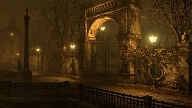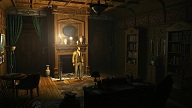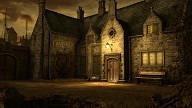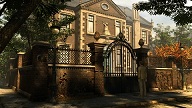Petty thief Timothy Moor sits on the deck waiting for the boat to arrive at Plymouth. He was caught as a stowaway on the ship. Handcuffed, half-naked, and starving, the young man knows he will be handed off to the police once the ship reaches the shore. There is no telling how many days he will spend in jail. Hours pass as Timothy questions the wisdom of traveling to Plymouth. This was supposed to be an easy trip. He was supposed to meet his friend Brian and gather enough money to buy passage to America. As the boat docks, Timothy is not even sure he will ever see Brian again.
 A sailor shoves Timothy off the ship. An officer from the port patrol is waiting on the shore. There will be no sympathy for the stowaway. He will be sent straight to jail. Timothy looks at the police officer and back at the water. He cannot bear the thought of going to prison. In a desperate attempt to get away from the police, he dives into the water. As a bullet zips past him, Timothy notices a sewer entrance. He quickly swims into the tunnel, knowing that the port authority is not likely to follow. Now, he has to find a place to hide and get rid of the handcuffs. Perhaps someone in the city will take pity on the thief.
A sailor shoves Timothy off the ship. An officer from the port patrol is waiting on the shore. There will be no sympathy for the stowaway. He will be sent straight to jail. Timothy looks at the police officer and back at the water. He cannot bear the thought of going to prison. In a desperate attempt to get away from the police, he dives into the water. As a bullet zips past him, Timothy notices a sewer entrance. He quickly swims into the tunnel, knowing that the port authority is not likely to follow. Now, he has to find a place to hide and get rid of the handcuffs. Perhaps someone in the city will take pity on the thief.
As Timothy struggles to survive, another man arrives at Plymouth. After serving as a police officer out in the country for three years, Briscol has finally landed a job as a detective in the big city. Excited to begin his new job, Briscol reports to the police station. The detective is eager to make a good impression on his supervisor, but things don't exactly go according to plan. Within moments of his arrival, Briscol is robbed. He loses the documents that identify him as a police officer. He is too embarrassed to seek help from any of the other officers on duty. He will have to find a way to recover his belongings on his own. With some luck, he will hopefully put the shameful incident behind him and start active duty as a detective.
Alter Ego is a point-and-click adventure game that chronicles the story of Timothy Moor and Detective Sergeant Briscol as the two men become entangled in a murder investigation. Alternating between the two characters, players get a chance to experience 19th century England from two very distinct perspectives. With its excellent gloomy atmosphere, interesting protagonists, and beautifully designed locations, Alter Ego has a great deal of appeal. However, a few issues keep the game from being a complete success.
 The game begins as Timothy arrives at Plymouth and escapes from the police. You take control of the thief inside the sewers. Handcuffed and stripped down to his underwear, Timothy's situation looks rather desperate. However, as it turns out, the young thief can be quite persuasive and resourceful. The initial scene at the sewers does a great job of introducing Timothy and generating some excitement about the game. He might be a criminal, but it is hard not to root for the rugged thief that is simply trying to stay alive.
The game begins as Timothy arrives at Plymouth and escapes from the police. You take control of the thief inside the sewers. Handcuffed and stripped down to his underwear, Timothy's situation looks rather desperate. However, as it turns out, the young thief can be quite persuasive and resourceful. The initial scene at the sewers does a great job of introducing Timothy and generating some excitement about the game. He might be a criminal, but it is hard not to root for the rugged thief that is simply trying to stay alive.
As you begin to explore the city and interact with a few other characters, you will start to find out more about Timothy's personality. From the beginning, it is clear that Timothy is a scoundrel. As revealed through his internal monologues, Timothy can be very manipulative and deceptive. He knows how to turn just about any situation to his advantage. He is not afraid to steal what he needs either. However, he is far from a one-dimensional crook. Despite his uncaring attitude, he is capable of compassion. At times, he can also be quite courageous.
In sharp contrast to Timothy, Detective Sergeant Briscol is a highly disciplined police officer. Briscol takes his job very seriously and has a great sense of duty. He is also a little arrogant. He clearly sees himself as superior to the other police officers. He is loathe to take their advice and expects his orders to be followed to the letter. He is not fond of getting his hands dirty either. Briscol demands that the lower-ranking officers handle the grunt work. Menial labor is simply beneath the detective. However, as evidenced by the mishap with his documents, the detective's inexperience frequently gets in his way. Perhaps Briscol is not exactly cut out for the challenges of a complex murder investigation.
It is great to see that the developers took the time to flesh out the personalities of the two main characters. Timothy and Briscol's attitudes really come through as you interact with other characters and solve puzzles. They expand beyond being just a thief and a policeman. Their distinct personalities make both characters fairly interesting and fun to control.
 During the early stages of the game, Timothy and Briscol follow separate storylines. Timothy tries to stay away from the police and find his friend Brian. In the meantime, Detective Briscol settles into his new job and starts investigating what is initially thought to be a small disturbance at a local graveyard. As you move from one chapter to the next, newspaper clippings inform you that a local aristocrat named Sir William is dead. Evidently, William was associated with a series of murders, but nothing was proven. As expected, these three seemingly unrelated plot threads gradually converge, forming a fairly intricate murder mystery.
During the early stages of the game, Timothy and Briscol follow separate storylines. Timothy tries to stay away from the police and find his friend Brian. In the meantime, Detective Briscol settles into his new job and starts investigating what is initially thought to be a small disturbance at a local graveyard. As you move from one chapter to the next, newspaper clippings inform you that a local aristocrat named Sir William is dead. Evidently, William was associated with a series of murders, but nothing was proven. As expected, these three seemingly unrelated plot threads gradually converge, forming a fairly intricate murder mystery.
The game does a nice job of tying Timothy and Briscol's storylines together. The convergence feels fairly fluid and natural. It definitely helps that Timothy and Briscol have such distinct perspectives. Alternating between the thief that is merely struggling to survive and the pompous detective that is trying to nail his first major case adds a welcome level of depth to the story.
The characters also undergo some changes during the course of the game. They are not oblivious to the things happening around them. As events escalate, Timothy begins to mature and gains a sense of responsibility. In the meantime, Briscol becomes increasingly paranoid and somewhat desperate. These changes help make both characters more interesting. You may find yourself pushing forward just to discover what will eventually happen to the duo.
Besides the intriguing protagonists, Alter Ego offers an excellent atmosphere. Plymouth feels appropriately dark and gloomy. There is a sense of sadness and desperation in just about every location you explore. It feels as if the entire city feels the weight of the murders that happen throughout the story. While Alter Ego is not a horror game, there are also a few creepy moments that nicely augment the atmosphere. It is difficult to describe these without completely spoiling the plot, but the best one was a delightfully spooky segment where the screen goes completely black. It is a nice throwback to one of the major clues you discover earlier in the game and does a good job of creating a sense of danger.
 Despite the overall somber tone, the game is not so depressing that it becomes difficult to play. The developers were careful to interject a bit of levity into some of the conversations. There are also amusing touches such as Detective Briscol looking directly toward the player and shaking his head 'no' when you try to perform certain actions. The game manages to strike a good balance where the attempts at humor feel welcome and do not detract from the overall moody atmosphere.
Despite the overall somber tone, the game is not so depressing that it becomes difficult to play. The developers were careful to interject a bit of levity into some of the conversations. There are also amusing touches such as Detective Briscol looking directly toward the player and shaking his head 'no' when you try to perform certain actions. The game manages to strike a good balance where the attempts at humor feel welcome and do not detract from the overall moody atmosphere.
Along similar lines, the 19th century setting feels very authentic. From architectural details on the buildings to the lamp posts, everything seems to be carefully designed to accurately capture the look and feel of 19th century England. Each location is also richly detailed. From the graveyard to the police station, the backgrounds are beautifully designed and pleasant to explore.
Since Alter Ego includes many conversations, it is worth noting that the voice-acting also seems appropriate for the time period. The accents are believable and the voices fit the characters nicely. More importantly, it feels as though the development team took the time to really explain each scene to the voice actors. In general, the lines are delivered with the correct intonations and the conversations feel natural. I did not notice any exaggerated exclamations or listless dialog that failed to deliver any sort of meaning.
The game is played from a third-person perspective and uses a mouse-driven interface. A single left click sends Timothy or Briscol to the desired spot on the screen. The mouse icon changes from the default yellow arrow to a red arrow when you hover over a hotspot. You can interact with the hotspot using the left mouse button or examine it using the right mouse button. The inventory is accessible from the bottom portion of the screen. Here you can combine inventory items or select an item to be used on a hotspot.
 Alter Ego also has a few player-friendly features. For starters, pressing the 'F1' key reveals all the hotspots on the current screen. It is also possible to press the 'E' key to see all the available exits. Since the game does have a few relatively small hotspots, these features can help avoid tiresome pixel-hunting. In addition, Alter Ego has a feature that helps players focus on the important hotspots. On each screen, there are some items that are interesting to examine, but not required for solving any of the game's puzzles. When you click on such objects once with the left mouse button and once with the right mouse button, they cease to be hotspots. Thus, if you are stuck, you do not have to waste time trying to use inventory items on objects that are not relevant to the current puzzle. This feature can be especially helpful to players that are new to adventure gaming. It nearly eliminates any frustration you might get from trying to use every single inventory item on every single hotspot.
Alter Ego also has a few player-friendly features. For starters, pressing the 'F1' key reveals all the hotspots on the current screen. It is also possible to press the 'E' key to see all the available exits. Since the game does have a few relatively small hotspots, these features can help avoid tiresome pixel-hunting. In addition, Alter Ego has a feature that helps players focus on the important hotspots. On each screen, there are some items that are interesting to examine, but not required for solving any of the game's puzzles. When you click on such objects once with the left mouse button and once with the right mouse button, they cease to be hotspots. Thus, if you are stuck, you do not have to waste time trying to use inventory items on objects that are not relevant to the current puzzle. This feature can be especially helpful to players that are new to adventure gaming. It nearly eliminates any frustration you might get from trying to use every single inventory item on every single hotspot.
In fact, the overall design of Alter Ego seems to be geared toward novice adventurers. In most sections of the game, you are restricted to a small number of screens. While you can use a map to travel from one part of the city to another, you only have access to two or three locations at any given point. All of these locations have a relatively small number of hotspots to investigate and inventory items to gather. Even if you get stuck for a few minutes, being confined to a small number of locations means that there is a very limited number of inventory item and hotspot combinations you can try. One of these combinations invariably work, allowing you to make progress without much difficulty.
The puzzles in Alter Ego are inventory-based. In many cases, you do not even need to combine inventory items. You just have to use the right item on the right hotspot. In general, the puzzles are straightforward and do not require tremendous leaps of logic or out-of-the-box thinking. In fact, since you are restricted to a small area at any given point, the challenges may seem especially easy. Taking the player-friendly features such as the 'F1' key into account, even those new to the adventure genre should be able to overcome the puzzles fairly easily. Unfortunately, these same features that make the game so accessible to newcomers may also make it frustrating for experienced gamers. Seasoned adventurers may just breeze through the game and feel dissatisfied with the difficulty level.
 However, the easiness of the puzzles is a minor problem compared to the plot development and pacing issues encountered during the game's final chapter. Alter Ego does a very good job of introducing the main characters and developing the story during the early portions of the game. The suspense level nicely increases as Timothy and Briscol's stories begin to merge. I was genuinely excited to see where the story was going as I started what turned out to be the final act of the game. Unfortunately, things fell apart during the last half hour of the adventure. The game tried to do too many things too fast, making the conclusion of the adventure feel abrupt and awkward.
However, the easiness of the puzzles is a minor problem compared to the plot development and pacing issues encountered during the game's final chapter. Alter Ego does a very good job of introducing the main characters and developing the story during the early portions of the game. The suspense level nicely increases as Timothy and Briscol's stories begin to merge. I was genuinely excited to see where the story was going as I started what turned out to be the final act of the game. Unfortunately, things fell apart during the last half hour of the adventure. The game tried to do too many things too fast, making the conclusion of the adventure feel abrupt and awkward.
The problem begins with the two characters that get introduced during the last chapter. These individuals play a major role in the conclusion, but they are introduced so late in the game that it is hard to care about them. They feel shoehorned into the story just to deliver the obligatory plot twist you expect from a murder mystery. In addition, a couple of major events get communicated via conversations. You do not get to witness exactly what happens, which somewhat hurts the atmosphere.
The final offender is the manner in which the adventure is concluded. I do not really have a problem with the actual events that transpire during the ending movie. Not every story needs a perfect happy ending. The darker tones actually fit the rest of the game very well. However, the conclusion is so abrupt that it feels anticlimactic and dissatisfying. It is not a problem to leave a couple of things open for a potential sequel, but cramming major developments into an extremely brief video and unceremoniously sending players back to the main menu is hardly acceptable. It is a shame if financial reasons kept the developers from delivering the conclusion that was initially intended. Timothy and Briscol's adventure deserved a more complete ending. Here's hoping we will get a sequel to tie up the loose ends.
Taken as a whole, Alter Ego is an enjoyable game with a number of very positive elements. Both Timothy and Briscol make for great characters to control. Their individual storylines and the game's overall plot are interesting and encourage players to keep pushing toward the end. The 19th century setting is realized beautifully and the game has a very fitting gloomy atmosphere. However, a couple of issues hurt the overall experience. While the game is extremely beginner-friendly, the simple puzzles may be frustrating for veteran adventurers. More importantly, the final chapter of the game feels rushed, providing a dissatisfying conclusion to an otherwise entertaining adventure. Fortunately, at least in my opinion, the positive aspects of Alter Ego manage to outweigh the negatives. If you are in the mood for a macabre story and like the idea of controlling two characters with unique perspectives, do not miss Alter Ego. It may not be an amazing game, but it is certainly entertaining.



|

